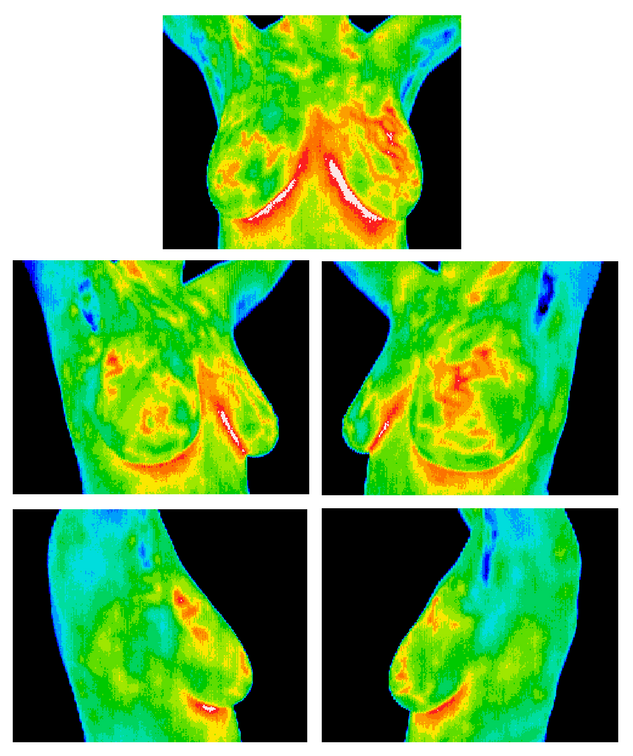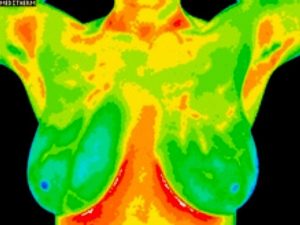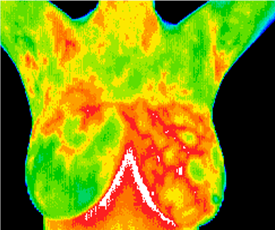
Breast Thermography
Breast thermography is a simple, pain-free, and safe way to monitor your breast health. There is absolutely no touching, no radiation, and no breast compression! All women’s breast, half, and full body scans are performed by a female certified clinical thermographer.
In your first year of thermography, 2 breast scans are performed 90 days apart. Your first scan is to establish your baseline. Your baseline scan represents your unique thermal fingerprint—a pattern that will only change due to a developing pathology. Without the 90-day follow up assessment, there is no way to determine if your thermal pattern is stable or changing at the time of the scan. Why wait 90-days? Active cancer cells double approximately every 90 days. If there are any changes occurring in the breast, this is the earliest method of detection! There is NO substitute for establishing an accurate baseline! All subsequent testing will be compared to previous scans and your baseline. If there are any suspicious changes in your thermogram, the physician interpreting your scan will provide the recommended time frame for your next follow-up scan.
Breast thermography screens for indications of:
- Cysts
- Lymphatic congestion
- Hormonal imbalances
- Generalized inflammation
- Fibrocystic breasts
- Inflammatory breast disease
- Tumors of the breast
- Angiogenesis

Pricing
$175 - Initial Scan
$160 - Yearly / 90-day follow-up
Pricing includes: breast imaging, physician interpretation report, 16-page breast health booklet with prevention tips & techniques, same-day in office review of your images, and a personalized breast health plan. Learn even more about your breast health by upgrading to a half body scan.
Preparing for your Breast Thermogram
- For 24 hours prior to your scan – avoid heavy exercise, acupuncture, massage, sauna or steam rooms.
- For 2 hours prior to your scan – avoid exercise and hot or cold showering. Do not shave under your arms or use deodorant, skin creams or lotion in the areas to be imaged. Avoid sun exposure the day of the test. For best result, you should not have had a sun burn or have used a tanning booth within a week of your test.
- Please wear loose fitting clothing the day of your scan. Your scan will be delayed until irritation marks from tight fitting clothing have dissipated.
- No changes in diet or medication are necessary.
Note: you must wait 3 months after pregnancy, nursing, major breast surgery, chemotherapy, or radiation before having a breast scan, and at least 1 month after a biopsy or minor surgery, such as mole removal, for results to be accurate.



What to Expect
Your appointment will take approximately 30 minutes. You will be asked to remove all upper body clothing and jewelry. We will supply you with a lightweight cover to wear for privacy while you acclimate to the room’s temperature. Prior to your scan, we will review your intake form with you. Please be sure to inform us of any recent skin lesions on your breasts that may affect the results. Thermal images of the breasts and surrounding areas will then be taken. Following your scan, we will review your images with you and answer any questions you may have. Your scans will be sent to a physician for interpretation. Reports are normally back within 48 hours and will be securely e-mailed to you (unless alternate method requested).
. . . . . . . . . .
Breast Thermography: A Review of the Research
- In 1982, the FDA approved breast thermography as an adjunctive breast cancer screening procedure.
- Breast thermography has undergone extensive research since the 1950s, with over 800 peer-reviewed studies in the index-medicus literature. These studies have evaluated more than 300,000 women (large studies comprising over 85k women), and followed for up to 12 years.
- Breast thermography has an average sensitivity and specificity of 90%.
- An abnormal thermogram is 10 times more significant as a future risk indicator for breast cancer than a first order family history of the disease.
- A persistent abnormal thermogram carries with it a 22x higher risk of future breast cancer.
- An abnormal infrared image is the single most important marker of high risk for developing breast cancer.
- Breast thermography has the ability to detect the first signs that a cancer may be forming up to 10 years before any other procedure can detect it.
Please note: It is important to remember that no test is 100% accurate. For this reason, we suggest a multifaceted approach to monitoring your breast health. As a reminder, thermography and mammography are detection methods and are NOT diagnostic tests for breast cancer. Only a biopsy can diagnose breast cancer.
